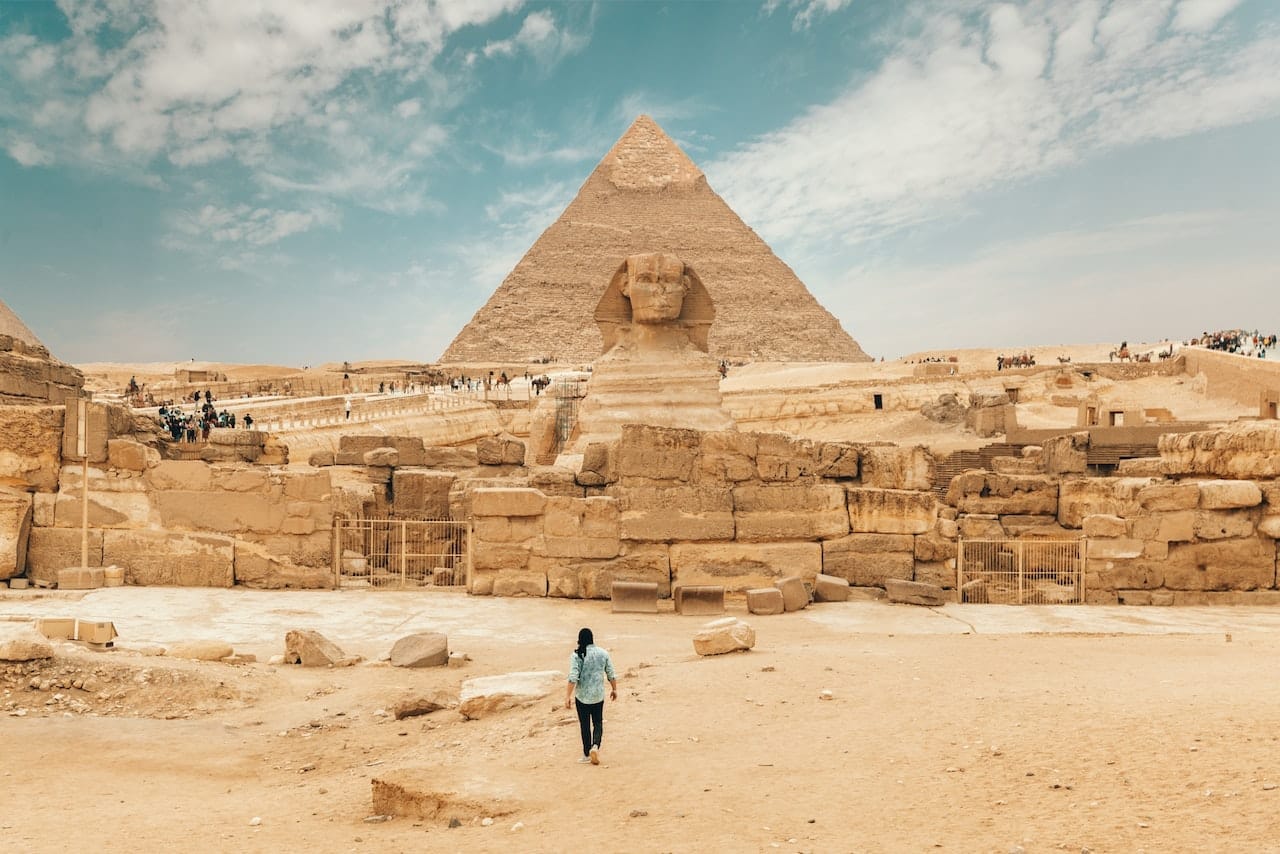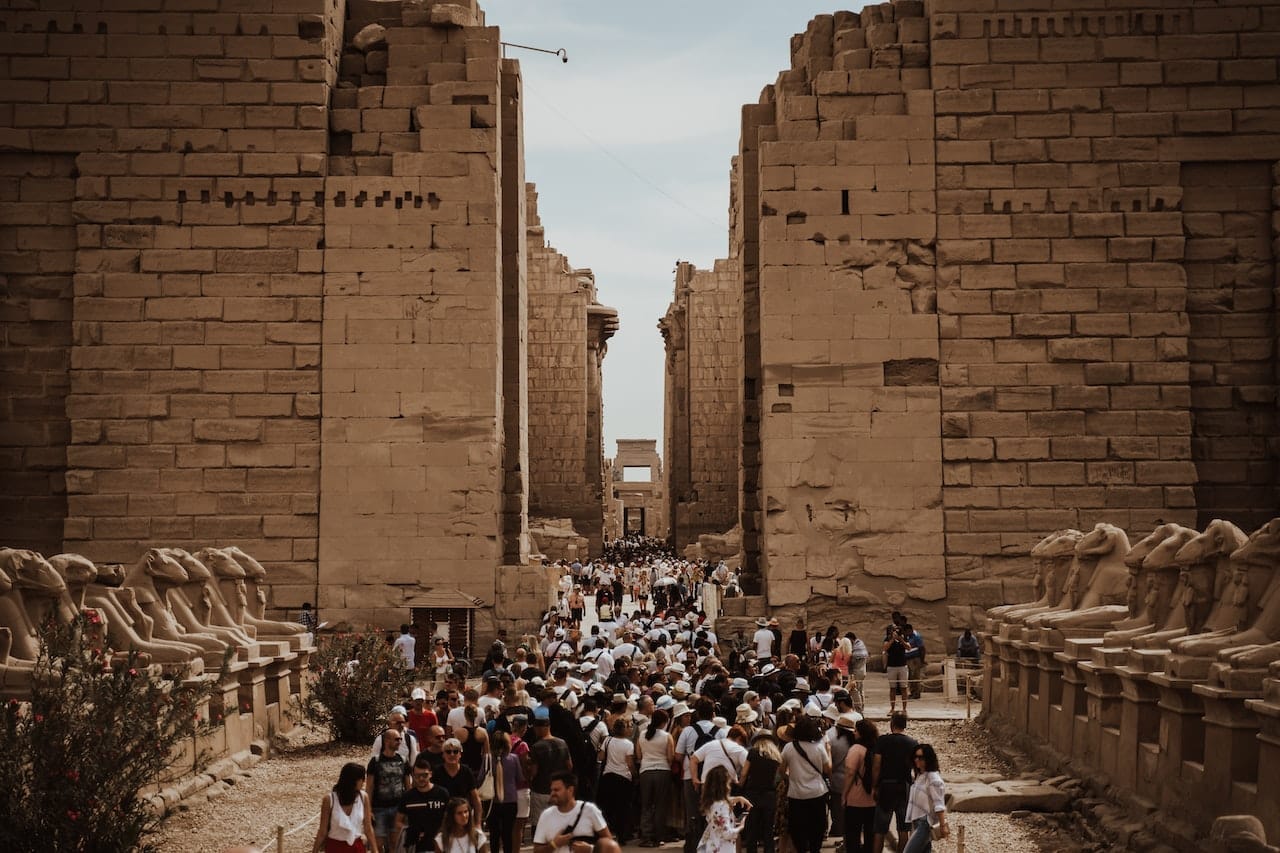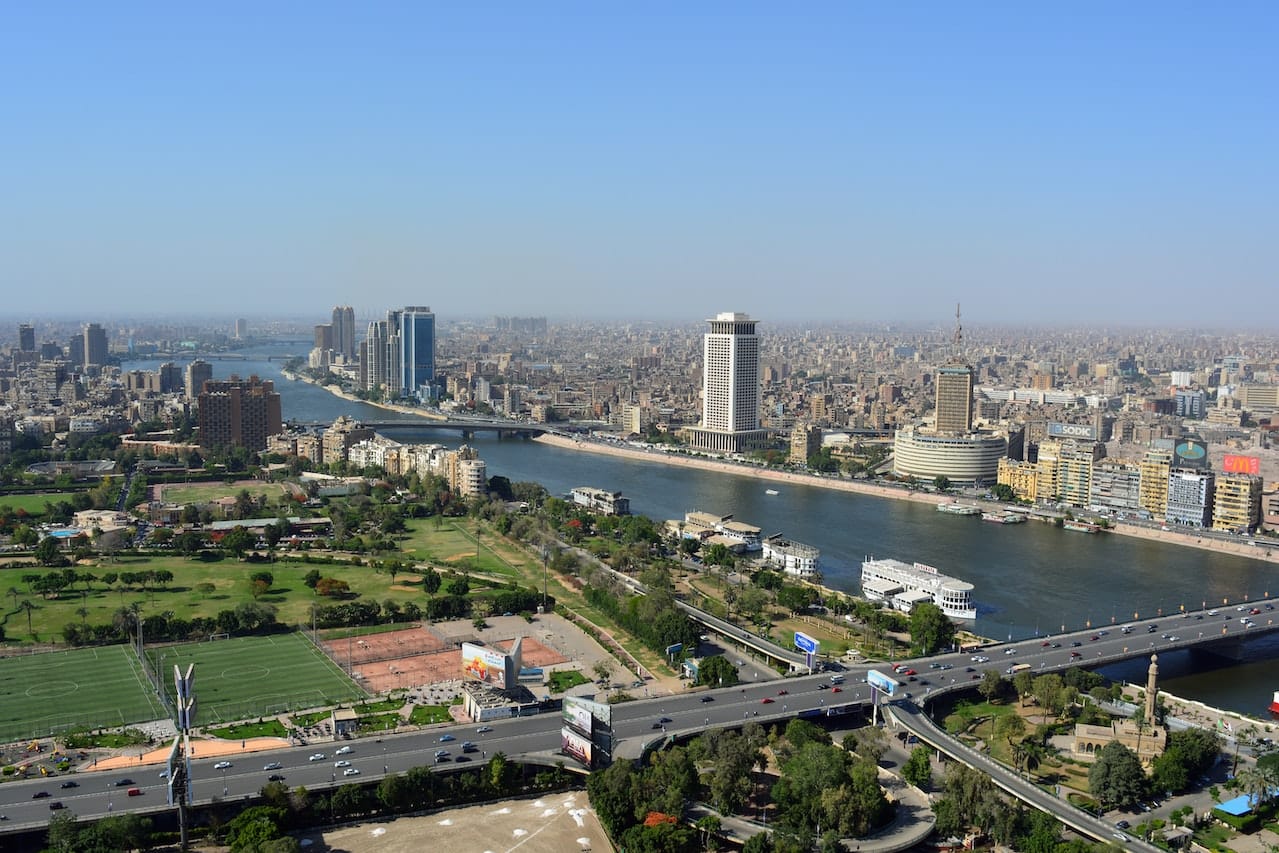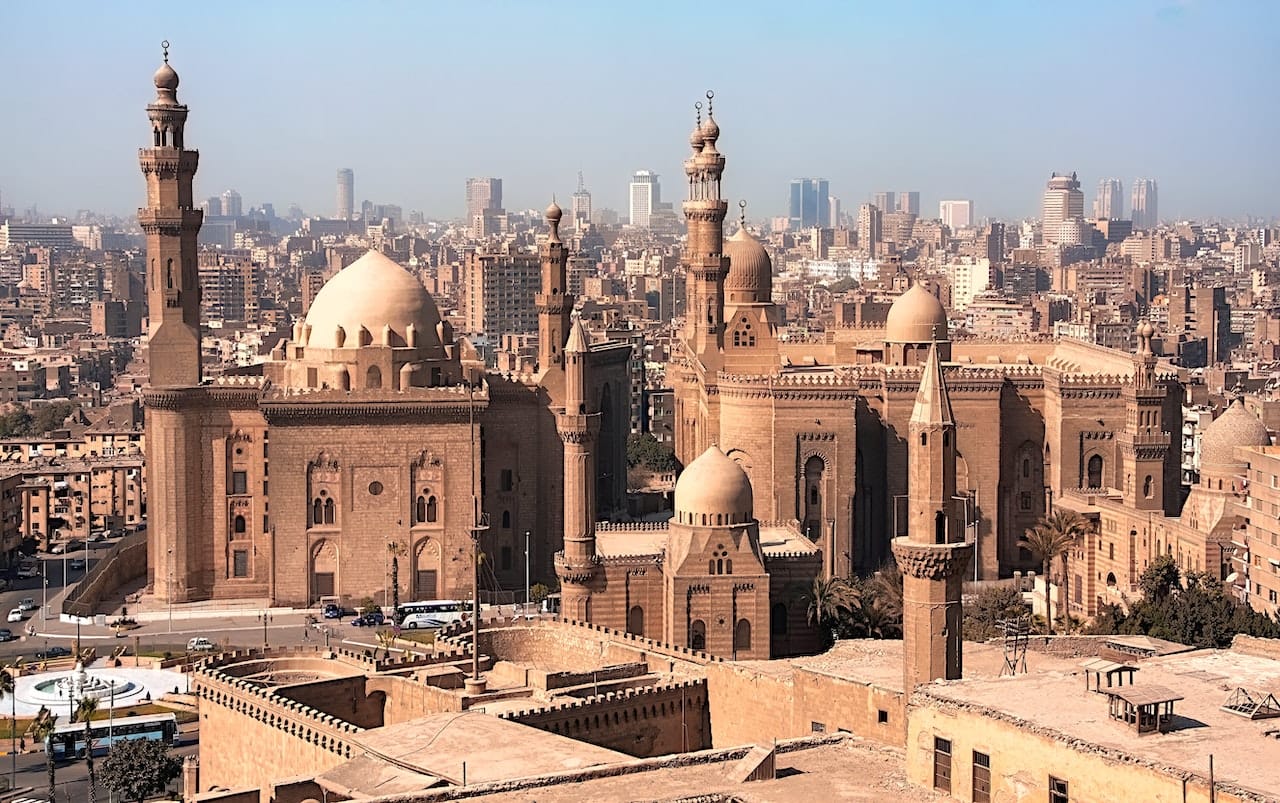Are you ready to immerse yourself in the rich history and vibrant culture of Egypt? From the mighty pyramids to the bustling streets of Cairo, as you explore the land of the pharaohs through this article, you'll be transported back to an era of ancient mysteries and wonder.
However, Egypt is not just a relic of the past. Instead, it's a country evolving rapidly, with a growing young population eager to shape its future. As a result, Egypt has opportunities to seize, from the buzzing startup scene to the thriving tourism industry.
So, pack your bags and don your explorer's hat since we will conduct the Egypt PESTLE Analysis in today's article. This PESTLE analysis will enable you to discover everything Egypt offers and accompanies our SWOT analysis of Egypt.

Egypt is a country in North Africa with a rich and fascinating history of thousands of years. The history of Egypt is often divided into several major periods, including Ancient Egypt, Islamic Conquest and Ottoman Rule, British Occupation, and Modern Egypt.
Ancient Egypt is perhaps the most well-known period of Egypt's history. During this time, the ancient Egyptians developed an advanced civilization that lasted for thousands of years.
The ancient Egyptians are known for their impressive architecture, such as the temples and pyramids, as well as their advancements in science, art, and writing. In addition, the ancient Egyptians believed in a complex system of gods and goddesses and had a highly organized social hierarchy.
In 641 AD, the Arab Muslim armies conquered Egypt and introduced Islam to the region. Egypt became a part of the Islamic Caliphate. A series of caliphs and sultans ruled it until the Ottoman Empire conquered Egypt in 1517.
The Ottomans ruled Egypt for the next four centuries. As a result, Egypt became a major center for Islamic scholarship and trade during that time.
In 1882, the British occupied Egypt, establishing a protectorate. British control of Egypt lasted for several decades and profoundly impacted the country's history.
During this time, Egypt became a major center of cotton production. British investment in the country led to significant infrastructure projects such as the Suez Canal.
Egypt gained independence from British rule in 1952, following a period of political upheaval that saw the rise of the Free Officers Movement. The country was initially ruled by military leaders, including Gamal Abdel Nasser, Anwar Sadat, and Hosni Mubarak.
In recent years, Egypt has undergone significant political and social change, including a popular uprising in 2011 that led to the overthrow of President Mubarak.
Egypt is a major cultural and economic center in the Middle East and North Africa. The country's history and culture continue to be a major draw for tourists worldwide. In addition, Egypt remains an important center of trade and commerce in the region.
Despite its challenges, Egypt remains a vibrant and important country with a rich history and culture that continues to evolve.
Now that we have discussed the history of Egypt let's proceed further and see what PESTLE Analysis is.
PEST analysis is a tool that analyses different external factors that impact organizations and businesses. PESTLE analysis analyses different external factors such as political, environmental, social, economic, technological, and legal factors.
Now let's proceed and conduct Egypt's PESTLE analysis.

Political Factors That Affect Egypt
Egypt is a country with a long and complex political history. Over the years, various political factors have influenced the country's political landscape, shaping its political institutions and systems.
One of the primary political factors that affect Egypt is government stability. Therefore, the stability of the government is a crucial factor in determining the political landscape of Egypt.
The country has experienced significant political instability in recent years, including protests and uprisings that have led to changes in government. The stability of the government is essential for maintaining order and ensuring that the country can function effectively.
When the government is unstable, it can lead to unrest and even violence, negatively impacting the country's economy and citizens' well-being.
Besides that, Egypt's foreign policy is also an important political factor that impacts Egypt. Egypt is a vital player in the Middle East, and its political decisions can significantly affect the region.
For example, the country's relationship with Israel is crucial for maintaining peace in the region. Likewise, Egypt's relationship with the United States is essential for ensuring economic and military support, which can impact the country's political decisions.
Moreover, another important political factor that affects Egypt is the military's role. Egypt has a long history of military rule, with the military's dominant role in the country's politics.
The military has been involved in many significant political events in Egypt's recent history, including the overthrow of former President Hosni Mubarak in 2011 and the subsequent rise of the Muslim Brotherhood.
The military's influence in Egyptian politics is significant, and it is essential to consider when analyzing the country's political landscape.

Economic Factors That Affect Egypt
Egypt has a developing economy, and several economic factors affect its growth and stability. Inflation is a significant economic factor that affects Egypt.
High inflation rates can increase prices for goods and services, negatively impacting the country's citizens' purchasing power. Currently, Egypt is experiencing a high level of inflation.
In March 2023, Egypt was subject to almost 40% inflation, considered the country's highest level of inflation in years.
Inflation can also lead to economic instability, as investors may hesitate to invest in a country with high inflation rates. Therefore, foreign investment is also an essential economic factor that affects Egypt.
Foreign investment can provide much-needed capital for the country's development projects and help create jobs for its citizens.
The Egyptian government has implemented several policies to attract foreign investors, including offering tax incentives and streamlining the process of establishing new businesses.
However, political instability and uncertainty can deter foreign investors, negatively impacting the country's economic growth.
The agricultural sector is a vital economic factor in Egypt, accounting for 11.3% of the country's GDP.
The Nile River is a crucial resource for the country's agricultural sector, providing water for irrigation and farming.
However, climate change and water scarcity can pose significant challenges for the country's agricultural sector, which can negatively impact the country's economy.
The Egyptian government has made policies to address these challenges, including investing in new irrigation technologies and promoting sustainable farming practices.

Social Factors That Affect Egypt
Egypt is a country with a rich cultural heritage and a diverse population. In addition, social factors affect the country, including religion, education, and healthcare.
Education is a crucial social factor that affects Egypt. However, the country has made significant strides in improving access to education, with free and compulsory primary education.
However, the quality of education remains a challenge, with overcrowded classrooms, outdated curricula, and a lack of resources.
These factors have led to low literacy rates and limited opportunities for students to pursue higher education.
The Egyptian government has implemented several policies to address these issues, including increasing investment in education and modernizing the curricula.
Gender equality is another social factor that affects Egypt. Despite progress in recent years, women still face significant challenges in accessing education, employment, and political representation.
Gender-based violence and discrimination are also widespread, with limited access to support and resources for victims.
The Egyptian government has implemented several policies to address these issues, including legislation to protect women's rights and increase their participation in political and economic life.

Technological Factors That Affect Egypt
Like any other country, Egypt is impacted by various technological factors. This section will look into some of the most significant technological factors affecting Egypt.
Egypt has been investing heavily in renewable energy production in recent years. The country has been using solar and wind energy to reduce its reliance on fossil fuels and to provide more electricity to its population.
The government's focus on renewable energy has helped to address the country's energy crisis and create job opportunities in the renewable energy sector.
Besides that, e-commerce has become a significant sector in Egypt's economy, with more businesses and individuals embracing online shopping.
However, the lack of a secure online payment system and the limited access to digital payment options have been challenges for the growth of e-commerce in the country.
Moreover, Egypt has experienced significant growth in internet penetration, with 72.4 million internet users as of 2021.
This has significantly impacted the country's economy and social fabric, as more businesses and individuals are using the internet for communication, commerce, and entertainment.

Legal Factors That Affect Egypt
Legal factors that affect any country primarily reflect the law and order situation in a country. In this section, we will analyse the most significant legal factors affecting Egypt.
Egypt's constitution is a significant legal factor that affects the country. The constitution lays down the fundamental principles of the country's legal system and the rights and duties of its citizens.
The country's constitution has been the subject of several revisions over the years, with the most recent amendment in 2019.
Moreover, Egypt's legal system is based on civil law, derived from Islamic law, the Napoleonic code, and modern statutes.
The legal system comprises three branches: the judiciary, the prosecution, and the police.
However, the independence of the judiciary has been a significant issue in Egypt, with concerns raised about the influence of the executive branch on the judiciary.
Besides that, intellectual property rights have been a significant legal issue in Egypt. The country has been criticized for its lax enforcement of intellectual property laws, which has impacted innovation and economic growth.
However, the government has taken steps to improve the legal framework for intellectual property, including establishing specialized courts to handle intellectual property disputes.

Environmental Factors That Affect Egypt
The country is impacted by various environmental factors that impact its growth and prospects.
Desertification is an environmental factor that affects Egypt. The country's desert areas are expanding, leading to soil degradation, biodiversity loss, and decreased agricultural productivity.
Desertification has been caused by human activities such as overgrazing, deforestation, and improper land use.
Air pollution is considered an important environmental factor that affects Egypt. The country's cities, particularly Cairo, are known for their high levels of air pollution, which have been linked to respiratory diseases and other health problems.
Air pollution in Egypt is caused by a combination of factors, including industrial activity, traffic congestion, and the burning of fossil fuels.
Moreover, water scarcity is a significant environmental factor that affects Egypt. The country is in arid and semi-arid regions, making it dependent on the Nile River for its water needs.
The increasing demand for water due to population growth and economic development has put pressure on the Nile River, which has led to concerns about water scarcity.
Biodiversity is another environmental factor that affects Egypt. The country is home to various plant and animal species, including several endemic species.
However, biodiversity in Egypt is under threat due to habitat loss, overexploitation, and climate change.

Egypt PESTLE Analysis: Final Word
Egypt's rich history and culture continue evolving and offering numerous opportunities.
The Egypt PESTLE analysis has revealed various political, environmental, social, economic, technological, and legal factors that impact Egypt.
This article would have increased your knowledge about the history of Egypt. Besides that, it would have also made you guys aware of the PESTLE analysis framework.
If you liked this article and want to read more PESTLE Analysis articles, then look at some examples of PESTLE Analysis.










